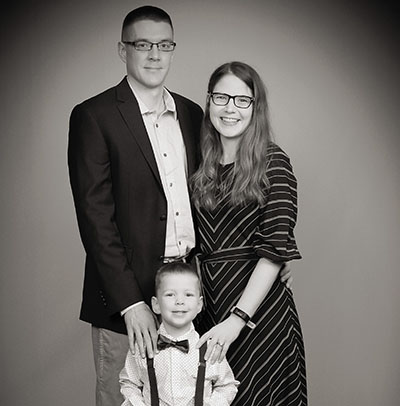This article is a part of a series focusing on the mental health of health care workers that will continue into Mental Health Awareness Month in May. If you would like to share your mental health story with others, email Steve Wengel, MD, assistant vice chancellor for wellness, UNMC and UNO, and/or Sarah Richards, MD, senior medical director, care experience, Nebraska Medicine.
 |
Melanie Lynch and family |
By outward appearances, I’ve always been a healthy, successful and happy person. When I was a child and teenager, I got good grades, loved to read and was active in extra-curricular activities in high school and college. But my private life was a different story.
I could pull myself together in public, but at home, I was cyclically sad, irritable and angry with my parents, my siblings and my boyfriends. I would get anxious over something simple, like what to wear to church on Sundays, or yell at my siblings for no reason. My parents chalked it up to normal teenage behavior, so I did, too. I didn’t realize there was anything wrong until later in my life.
The first time I sought therapy, I was in college. My relationship with my now-husband was rocky, and the stress of college life was overwhelming. I felt isolated and alone in my feelings. Unfortunately, I didn’t have a very good experience with the therapist, so I went several years without seeking help again. I could never shake the feeling that something was wrong with me, but I was too afraid to seek help, for fear of seeming weak to other people. For several years, I felt like I could just handle these feelings on my own, and I did. But I was never really content, and I felt like something needed to change. I just didn’t know what.
My recovery journey: A doctor’s story
When I found out I was pregnant in 2015, I was over the moon. The next nine months seemed like a blur as my husband and I prepared the nursery for the birth of a baby boy. We had everything we needed, and on a beautiful Sunday morning in June 2016, our son was born. I remember feeling so proud and overwhelmed with joy and gratitude. I took eight weeks away from work to settle in at home and get used to being a parent.
Then everything changed. Somewhere around week four postpartum, I was no longer my usual self. I was tired, irritable and had mood swings where I screamed in anger, then sobbed uncontrollably over the guilt I felt for losing control. I would sit on the couch for hours at a time, listless and wishing I could sleep the time away. When I saw my OB provider at eight weeks, I told her how I felt. She said, “Well, if it gets worse, let me know.” I didn’t know what to do at that point, so I went back to work. It was the only place I felt normal. When I put on my scrubs, I was a different person. I focused on the tasks at hand for each patient, and I would come home from work exhausted and eventually burned out.
When I came home, again it was a different story. My husband bore the brunt of my mood swings, and it all came to a head after one of our biggest arguments. I told him I wanted to die. He said the words that changed our lives.
“Mel, I need you to get some help. If you won’t do it for yourself, please do it for me.”
I realized he was right. The way we were living wasn’t sustainable. I had very clear signs and symptoms of post-partum depression, and it wasn’t going to go away on its own. That night, I called my former employer’s 24-hour EAP line and talked to a counselor, who was able to get me through the crisis and scheduled with a therapist through our EAP. After completing the free sessions, I continued to see a therapist.
My husband was deployed for nine months in 2018, and when he returned home we decided we wanted to add to our family. After a year of trying, I became pregnant, but unfortunately, experienced a miscarriage at around 10 weeks in January 2020. Again, I sought help through our EAP, with one of the therapists at Arbor Family Counseling. My therapist helped me process my feelings and work through my grief.
But I was still having problems. Last July, I had a severe panic attack, which was incredibly scary. I began journaling more frequently so that I would have more information for my doctor. Last September, I scheduled my annual visit and after talking through my symptoms was diagnosed with pre-menstrual dysphoric disorder, or PMDD. PMDD is a condition similar to PMS that occurs one-two weeks prior to a menstrual cycle and affects up to 5% of women of childbearing age. Symptoms include irritability or anger that can affect relationships with others; feelings of sadness, despair, tension, anxiety or loss of control; mood swings; trouble with thinking or focusing; fatigue; and physical symptoms such as headaches or bloating.
I felt relieved that I finally had a reason for the symptoms that had been plaguing me for years and started taking a low dose of Zoloft, which has helped with many of the mental symptoms I experience on a monthly basis.
This year, after seeing a reproductive endocrinologist, I was diagnosed with Hashimoto’s thyroiditis, and started levothyroxine. These medications, along with a healthy diet, regular exercise and journaling, help me feel like myself most of the time. I still have days where I am exhausted, or feeling irritable for no apparent reason, but my life has greatly improved.
I was afraid to ask for help. I was afraid of looking weak, of looking like a bad mother, or someone who couldn’t be trusted. But I realized that I didn’t want to live in fear anymore, and that my mental health is just as important as my physical health. I now seek therapy regularly when I need help with processing life changes, and I encourage others to do the same. Seek help early, and often. Don’t wait until life feels overwhelming. Help, and hope, is always available.
If you are feeling depressed, anxious and need to talk with someone, you can email the Peers in Need of Support program and/or contact our Employee Assistance Program through Arbor Family Counseling at 402-330-0960 or the Suicide Prevention Helpline at 1-800-273-8255. Also available is the Nebraska Licensee Assistance program to assist those with health-related service licenses, certificate holders and registrants.

Wonderful, honest article. Thank you for sharing!
Thank you for sharing your journey.
Melanie, I applaud your strength and your courage. By sharing your story you are helping others. Thank you!
Thank you for sharing such a personal story, Melanie. So many people struggle in silence. This story is a wonderful way to let others know they are not alone. Bless you for caring for the hearts and lives of others.
Thank you for sharing your story. I also have PMDD and have made PMDD education and cycle tracking my platform to compete in the Mrs. Nebraska pageant. Too many women get misdiagnosed or are told that it is just their cycle. Cycle tracking and symptom tracking is the best way to get the right diagnosis and treatment!!! I am on a journey to create support groups and more awareness in Nebraska.